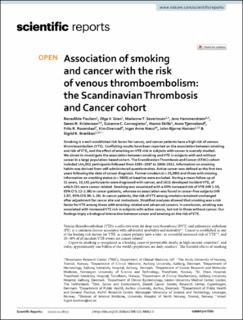Association of smoking and cancer with the risk of venous thromboembolism: the Scandinavian Thrombosis and Cancer cohort
Paulsen, Benedikte; Gran, Olga Vikhammer; Severinsen, Marianne T.; Hammerstrøm, Jens; Kristensen, Søren Risom; Cannegieter, Suzanne C.; Skille, Hanne; Tjønneland, Anne; Rosendaal, Frits; Overvad, Kim; Næss, Inger Anne; Hansen, John-Bjarne; Brækkan, Sigrid K.
Peer reviewed, Journal article
Published version

Åpne
Permanent lenke
https://hdl.handle.net/11250/2788703Utgivelsesdato
2021Metadata
Vis full innførselSamlinger
- Institutt for klinisk og molekylær medisin [3524]
- Publikasjoner fra CRIStin - NTNU [38047]
- St. Olavs hospital [2503]
Sammendrag
Smoking is a well-established risk factor for cancer, and cancer patients have a high risk of venous thromboembolism (VTE). Conflicting results have been reported on the association between smoking and risk of VTE, and the effect of smoking on VTE-risk in subjects with cancer is scarcely studied. We aimed to investigate the association between smoking and VTE in subjects with and without cancer in a large population-based cohort. The Scandinavian Thrombosis and Cancer (STAC) cohort included 144,952 participants followed from 1993–1997 to 2008–2012. Information on smoking habits was derived from self-administered questionnaires. Active cancer was defined as the first two years following the date of cancer diagnosis. Former smokers (n = 35,890) and those with missing information on smoking status (n = 3680) at baseline were excluded. During a mean follow up of 11 years, 10,181 participants were diagnosed with cancer, and 1611 developed incident VTE, of which 214 were cancer-related. Smoking was associated with a 50% increased risk of VTE (HR 1.49, 95% CI 1.12–1.98) in cancer patients, whereas no association was found in cancer-free subjects (HR 1.07, 95% CI 0.96–1.20). In cancer patients, the risk of VTE among smokers remained unchanged after adjustment for cancer site and metastasis. Stratified analyses showed that smoking was a risk factor for VTE among those with smoking-related and advanced cancers. In conclusion, smoking was associated with increased VTE risk in subjects with active cancer, but not in those without cancer. Our findings imply a biological interaction between cancer and smoking on the risk of VTE.
